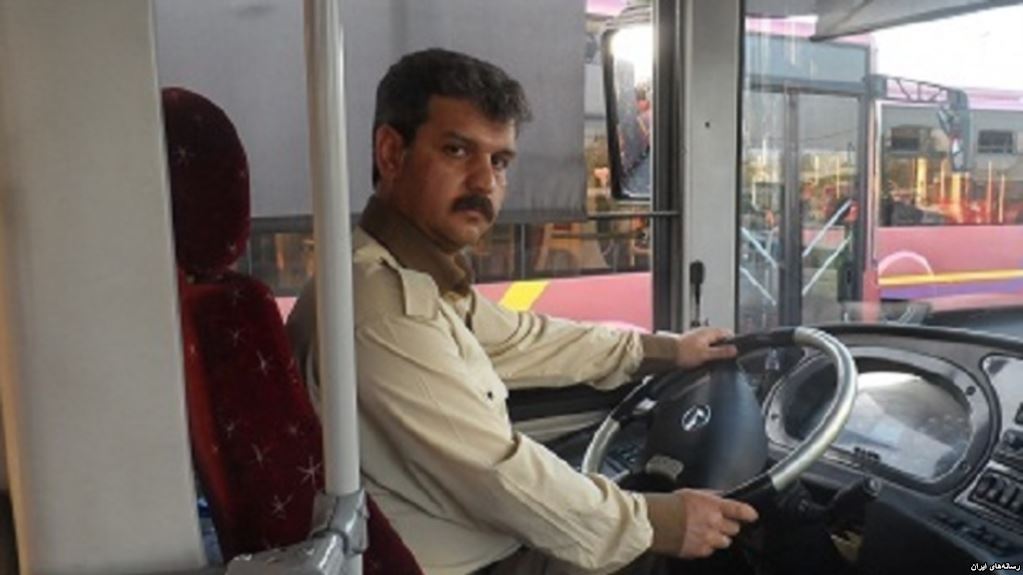Iranian Union Considers Mass Strike as Imprisoned Labor Activist’s Condition Deteriorates

An Iranian union is considering a mass strike to protest a prominent labor activist being returned to prison to serve an additional year behind bars two years after he was released.
Reza Shahabi, a board member of the Union of Workers of the Tehran and Suburbs Bus Company (UWTSBC), has been on a dry hunger strike since August 9, 2017.
“On Wednesday [September 6] we visited him in prison. He has severe headaches. His back hurts. His feet hurt. He has numbness on the left side of his body. He has become very weak. He has tingling in his left arm. He says his stomach hurts. His blood pressure and sugar level have dropped,” his wife, Robabeh Rezaei, told the Center for Human Rights in Iran (CHRI) on September 8.
Shahabi is one of more than 15 political prisoners held in Rajaee Shahr Prison, located 31 miles west of Tehran, who have been on a mass hunger strike since their sudden unannounced move to a security-enhanced ward on July 31.
The UWTSBC surveyed its members on September 8 on which method of mass action it should call for, including a one-hour strike, slowing down driving speeds on a designated date in congested traffic, turning on bus lights during the day time or holding a protest gathering.
“Even though Mr. Shahabi has been on a hunger strike for a month, the media inside Iran have not said a word,” a labor activist who asked to remain anonymous told CHRI. “Trade unionists from around the world have asked the authorities to let him go, but it hasn’t been effective.”
“Our peaceful gathering in front of parliament [on September 4] was met with police insults and batons,” added the source. “Now the only path we have left is to at least gain the support of UWTSBC members to hold a strike.”
Shahabi, 45, insists he has served his six-year prison sentence for “propaganda against the state” and “assembly and collusion against national security.” He was forced to return to prison on August 5, 2017, to serve an additional five months for the time he spent outside the prison for medical treatment in 2014.
However, upon returning to Rajaee Shahr Prison, he learned that a previous one-year conviction for his activism was now being enforced and he would not get out of prison until December 2018.
“The kids and I are very worried about his health,” Rezaei told CHRI. “He is being held in prison against the law. The least the authorities can do is transfer him to the hospital so we can be sure he receives proper medical care.”
Article 102 of Iran’s State Prisons Organization’s Regulations requires prison medical staff to give prisoners a checkup a minimum of once a month. Article 103 states that prisoners should be hospitalized for emergencies.
“The prison director is ignoring the hunger strike and therefore the doctor assigned to the prison is not checking his weight or blood pressure,” said the labor activist who spoke to CHRI. “The union is very worried about his condition.”
A number of foreign workers’ organizations have expressed solidarity with Shahabi and other labor activists imprisoned in Iran while calling for their freedom.
“We have received worrisome reports indicating the persecution, including detention, of workers and trade union leaders for exercising their fundamental trade union rights,” said a statement by the IndustriALL Global Union (IGU) on September 5.
“In this sense, we call for the immediate and unconditional release of all imprisoned workers and union leaders, including Ismail Abdi and Reza Shahabi,” added the statement.
Based in Geneva, Switzerland, the IGU represents 50 million workers in 140 countries.
Labor activism in Iran is seen as a national security offense; independent labor unions are not allowed to function, strikers are often fired and risk arrest, and labor leaders are consistently prosecuted under catchall national security charges and sentenced to long prison terms.






